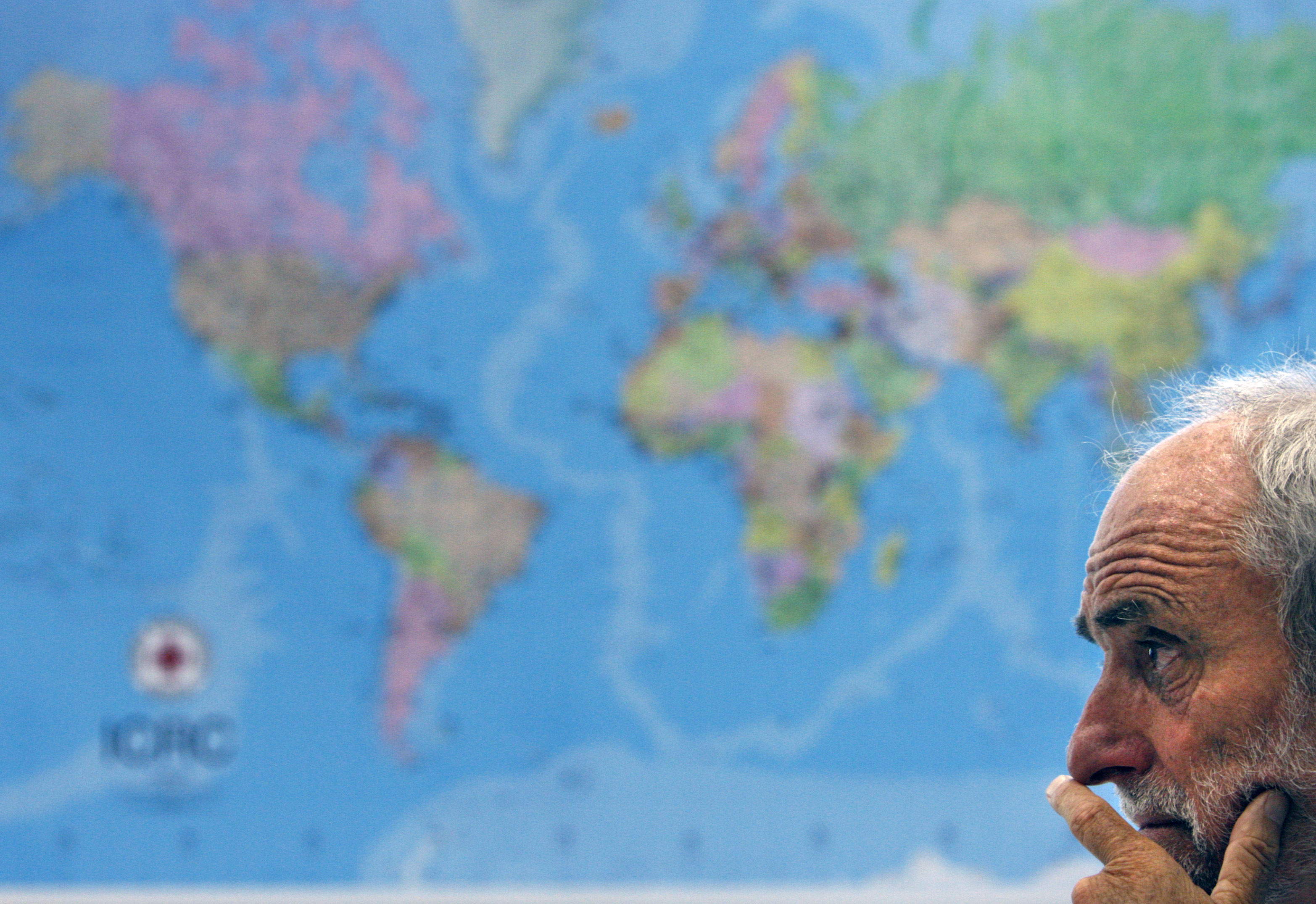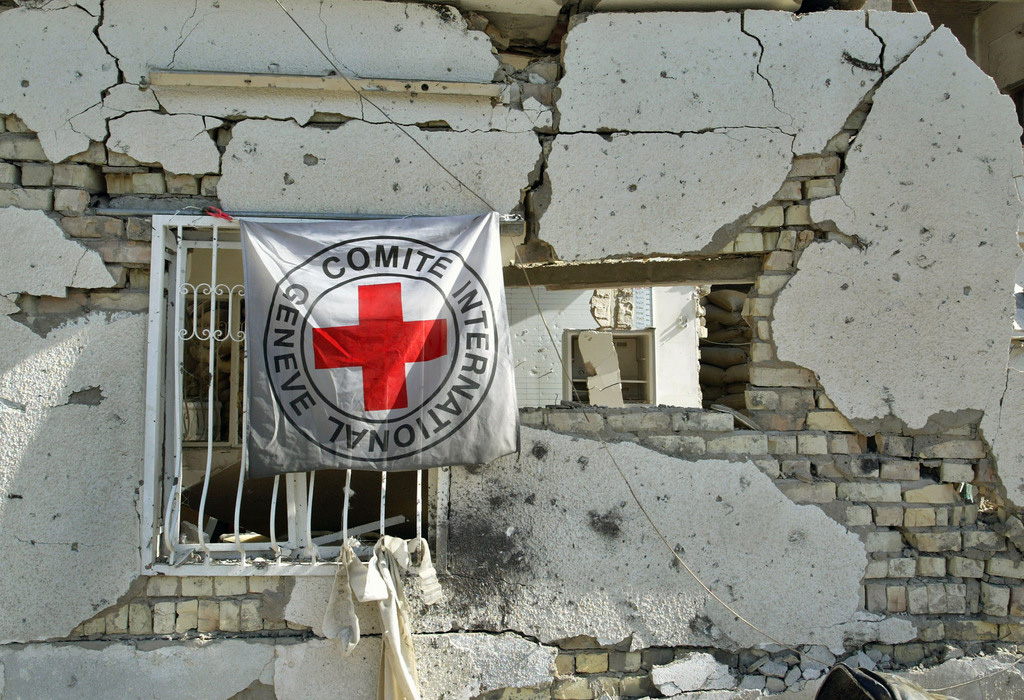“The ICRC today is a paradox”

As a humanitarian agency, the International Committee for the Red Cross has carved out a niche for itself compared with its competitors, but a look inside the unusual organisation can reveal many paradoxes.
What at first appear to be contradictions, such as a Swiss private agency with a special status in public international law, actually works well, according to David Forsythe, author of two books on the ICRC.
“Another paradox is that it has liberal goals, but conservative means,” Forsythe told swissinfo.ch.
“That is, it is interested in trying to protect human dignity, so it is liberal in that sense. But it proceeds slowly, cautiously, trying to get the consent of states and other important actors, and it tries, basically, to operate within the state system but advance the welfare of human beings.”
And there are other atypical features, noted Forsythe, a professor at Nebraska-Lincoln University in the United States who has done research into human rights and international organisations.
“It’s supposedly international, but it’s historically all-Swiss, and still Swiss at the top.”
Neutrality
July 1 marks a change at the top of the organisation, with former head Jakob Kellenberger leaving after 12 years as president and another Swiss diplomat Peter Maurer stepping into his shoes.
Forsythe argues the organisation, started by Swiss Henry Dunant in 1863, has created a special role for itself. While there now are other major aid groups like Doctors without Borders and Amnesty International, the ICRC has adopted a discretion-first approach which sets it apart and enables it to do a particular kind of work.
Doctors Without Borders, for instance, has a different definition of neutrality and believes it is possible to engage in public criticism while also remaining neutral.
“Whereas I think the ICRC believes the less you engage in public criticism the more we are likely to be seen as neutral. It’s probably good there are both types of organisation,” said Forsythe.
“Probably the more Amnesty International engages in public criticism, the more likely a government is to allow ICRC to make discreet prison visits. I think the ICRC has definitely carved out a role for itself on neutral, impartial, sometimes discreet humanitarian work.”
Secrecy, neutrality
“Not giving information is a practice that has existed for as long as anyone remembers,” according to the former head of the ICRC’s legal service, Louise Doswald-Beck, now an international law professor at Geneva’s Graduate Institute.
While at ICRC, she argued successfully that their staff should be exempt from giving evidence in the International Criminal Tribunal for the former Yugoslavia. “When it comes to confidentiality and prison visits, it’s been on that understanding that the ICRC’s had access.”
The nub of the matter is that ICRC delegates, once they’ve had access to the world’s most secretive places, cannot share their knowledge with anyone except the Geneva headquarters and the state in question. They generally stay silent, for fear the ICRC would become a target thereafter. If something is amiss, the ICRC cannot coerce the state in question, only remind them what international agreements on the treatment of prisoners of war say.
This neutrality, Doswald-Beck said, has helped the organisation accumulate a lot of respectability down through the years. “Governments do tend to trust the ICRC’s view on these things as being experienced, realistic, and that it knows what it’s doing.”
While such a policy of discretion has its uses, Forsythe argues “you can take that secrecy and diplomacy too far. It can become dysfunctional, because you will not build support in the broader public.”
He noted that while the ICRC is well known in governments, it’s not well known among the general public, particularly in the US where even journalists get confused by the different branches – ICRC, the Federation of the Red Cross, the American Red Cross – and what is the relation between all three.
What next?
Looking back, Kellenberger was “very good” for the ICRC, Forsythe concluded. Its ever-increasing budget, the continued support from the US and Russia and the fact that it has attracted “some very bright people” are signs that his time at the top has been largely positive, despite public diplomacy not being his strong point. “He’s not very good at networking at a cocktail party.”
Doswald-Beck said when Kellenberger took over the reigns he had to learn a lot very quickly about field work and she reckons, initially, this came at the expense of international humanitarian law.
“It’s something he’s understood since. The fact that if you don’t harp on, constantly, to governments, about the fact they have to respect the law, they won’t take it seriously,” she noted.
Maurer, who moves on from being Swiss Secretary of State for European Affairs, also has experience of international institutions, having been the Swiss Ambassador to the United Nations in New York. He is also reckoned to be a bit more outgoing than Kellenberger.
A journalist who asked Kellenberger at his farewell press conference whether he had been too discreet during his term found herself quickly corrected.
“I have always said the maximum I can, but while doing the minimum amount of harm to our work in the field,” replied Kellenberger sternly.
Whether he can light up a social gathering or not, he has been received in Syria three times since the conflict began, and has, he says, managed to negotiate larger humanitarian access each time. His successor will at least have that to build on.
The ICRC’s remit of neutrality and impartiality demands it offer relief to all sides in a conflict. In 1979, in Cambodia, when the ICRC couldn’t get assurances it would be able to deliver to everybody, the former Khmer Rouge as well as their victims, the ICRC refused to distribute food. Other organisations, such as Oxfam, chose to accept the restrictions in order to feed some of those who were starving.

In compliance with the JTI standards
More: SWI swissinfo.ch certified by the Journalism Trust Initiative












You can find an overview of ongoing debates with our journalists here . Please join us!
If you want to start a conversation about a topic raised in this article or want to report factual errors, email us at english@swissinfo.ch.